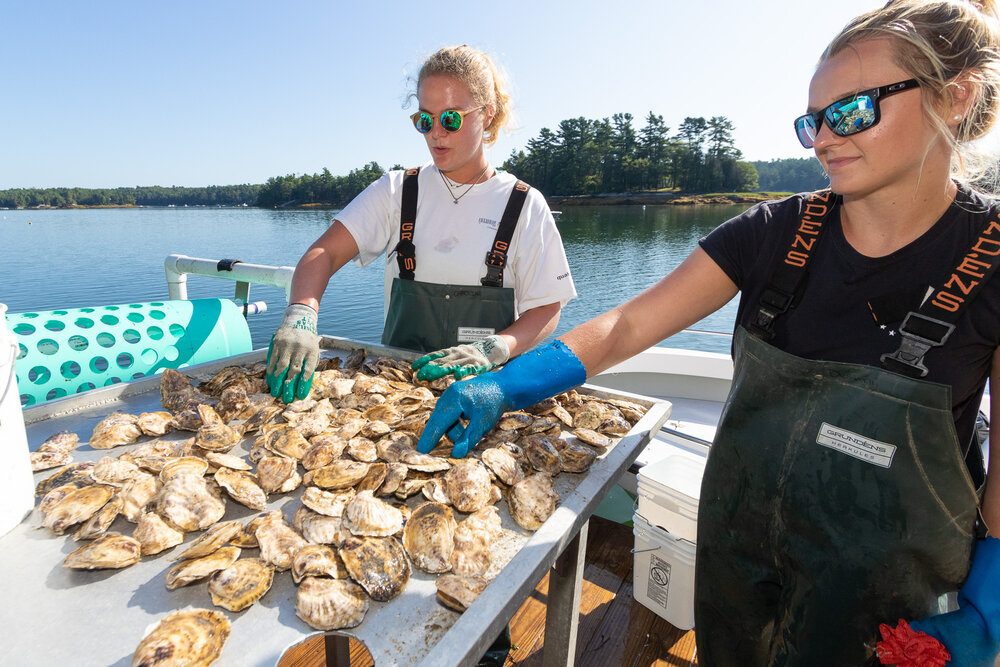Long-term climate change has impacted our oceans, and we are seeing the results more than ever. The Gulf of Maine Research Institute is dedicated to the resilience of the Gulf of Maine ecosystem and the communities that depend on it, while leveraging its work to address global opportunities and challenges. Shaw’s has supported this nonprofit through its GIVE BACK WHERE IT COUNTS Reusable Bag Program.
Tell us about the Gulf of Maine Research Institute.
Our mission is to pioneer collaborative solutions to global ocean challenges. We take an interdisciplinary, stakeholder- and user-driven approach.
The ocean challenges that we are currently addressing include protecting healthy ocean ecosystems; ensuring sustainable seafood for all; preserving the marine economy; and addressing climate change and all of its impacts on coastal ecosystems and communities.
We were founded in 1968 as an aquarium with public exhibits. Over time, we started to realize the need for engaging with marine industries in Maine and thinking more concretely about the types of research that we could conduct that would be most beneficial to communities in our region.
Our current form took shape in the early 2000s. We did an analysis of our work, which was evolving at the time as a mix of marine research, education, and community engagement, especially within fishing communities in the Gulf of Maine.
We rebranded as the Gulf of Maine Research Institute and opened our lab on Commercial Street in Portland, located in the heart of the working waterfront. Today, we’re focused on addressing those major ocean challenges that are having an impact not only here in the Gulf of Maine region but also on a global scale.
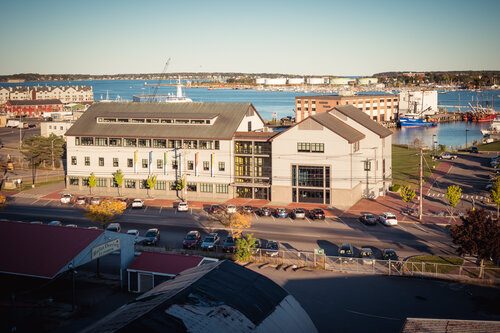
What services do you provide to the community?
The services that we supply are focused on uncovering and implementing science-based solutions to ocean challenges and understanding what impacts they’re having on and in the water, in the management arena, and across the seafood supply chain. We support the entire Gulf of Maine region, stretching from Cape Cod to Nova Scotia, and we estimate that we reach over 25,000 stakeholders a year.
We accomplish this by providing stakeholders with accurate and timely data from our portfolio of marine research. We’re also widely recognized for hosting community convenings like workshops and training sessions. We participate in state, regional, national, and international advisory bodies that are influencing management decisions in marine industries like fishing. We aim to invite a diverse mix of experiences, backgrounds, and voices to be empowered and have a seat at the table as we’re working together to address ocean challenges. We’re focused on improving access to information through these convening opportunities.
On the education side of our work, we’re particularly focused on students and teachers at the middle grade levels. We deliver education programs at population scale across the state of Maine, and they are free of charge for schools, teachers, and families. The program that we may be best known for is called LabVenture, which reaches nearly 10,000 students annually across the state of Maine from the fifth and sixth grade. That represents about 70% of fifth and sixth graders statewide. They come to our lab in Portland, and we offer a coach bus free of charge to the schools to transport students from wherever they are in the state to us. We recently had a school from Caribou visit, and that’s over a four-and-a-half-hour drive for them!
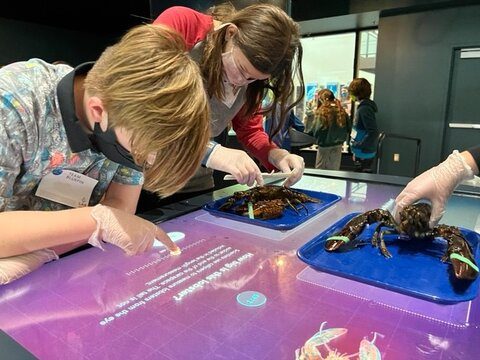
LabVenture is a two-and-a-half-hour experience that immerses students in hands-on research and data from the Gulf of Maine. It’s a very authentic experience for them. It’s not just simulating science—they are using real NASA satellite data and investigating real problems and questions that we don’t yet have answers to. As they learn about the science, they also start to understand what it means to be a scientist and the different ways that science can integrate into their own lives, maybe even their careers someday.
We also offer community science programs as a way to get kids and the general public outside exploring the environments and ecosystems in their own backyards and neighborhoods. We supply the curriculum, investigation protocols, and resources that anyone can use to conduct their own hands-on investigation. Participants collect data and observations that they can submit to ongoing research and monitoring efforts, like quantifying and locating invasive plant species or understanding dynamics in the intertidal zone.
Tell us a story that illustrates the good work you are doing.
Over the past few years, the pandemic completely changed and challenged our approach. Like many other nonprofit organizations, we closed our building in March 2020 when the pandemic hit. In particular, our education team had to make the best out of a tough situation and within several weeks formed an entirely virtual version of LabVenture and our other offerings. One of the benefits of the in-person experience was the interactive digital touch tables in our lab, which used software that could be translated into an online environment. Of course, it’s not quite the same as being there in person, but many of the lessons we were able to create online had kids experiencing the same activities they would during a normal LabVenture visit and then coming back together over Zoom to have conversations and to synthesize their learning.
We also had to work with different schedules across different schools. Taking a two-and-half-hour field trip and turning it into an online experience of equal length wasn’t going to work for everyone. So, we had different options where teachers could choose short lessons each day over the course of a week.
We also developed some companion offerings. We took our community science resources and altered them so that students could be a bit more independent, conducting those investigations on their own at home. It actually resulted in some great stories about kids who engaged their parents, siblings, and caretakers in doing the science with them.
We ended up serving about 5,000 students across the state from September 2020 through June 2021 with these virtual programs.
I want to share a quote from a teacher in Fryeburg, Maine, whose students participated in our virtual lessons:
“As teachers, we miss our students more than we ever thought possible. Seeing them excited about learning again has brought tears to our eyes more than once. I wish there was a way I could truly express what this week has meant to our kids and to my teaching team. There have been so many moments when we question and rethink our approaches to remote learning, and this week, there’s no doubt that the lessons are impactful and making a difference.”
Hearing feedback like that was monumental, keeping our spirits up and keeping us motivated to continue providing these services and to continue improving them as time went on. We learned along the way about how to best operate virtually, and stories like that and feedback from students and teachers guided us every step of the way.
We ended up serving about 5,000 students across the state from September 2020 through June 2021 with these virtual programs.
What is your greatest achievement or contribution to the community?
I’m personally deeply proud of my colleagues and our stakeholders and collaborators for the work that we were able to accomplish during the last two years of the pandemic. Being able to convene people virtually was such a blessing because so much of our work is focused on bringing stakeholders together, whether it’s students and teachers, fishermen, municipal leaders, or the concerned public who want to get involved in tackling ocean challenges. Being able to converse with them and involve them in the work is key to everything that we do across all of our programs. It was wonderful to be able to respond to urgent needs in communities while also staying focused on our long-term strategic vision.
What do you want people to know about Gulf of Maine Research Institute?
People are at the core of everything we do, whether we’re conducting research with collaborators, disseminating knowledge about the oceans, serving fishing communities and helping them adapt to changes happening on the water, or nurturing the next generation of leaders and marine scientists.
We want to make our services and the information that we obtain through our research accessible to as many stakeholders, users, and members of the public as possible so that we can all work together to protect the Gulf of Maine and our region’s future. It’s incredibly important to us that we invite all to join this conversation about changes that are happening in the Gulf of Maine.
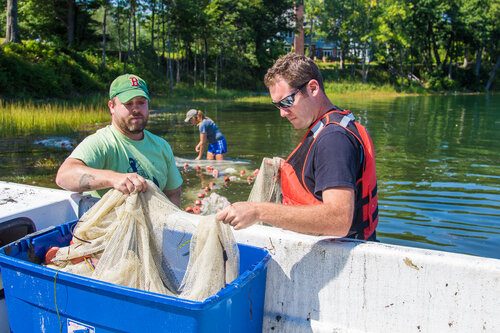
How are you using the funds you’ve received from the Shaw’s GIVE BACK WHERE IT COUNTS Reusable Bag Program?
Funds are applied to our core programs. This funding allows our education staff to welcome students and teachers from all across the state to join experiences like LabVenture at no cost to the schools or to the families.
It also allows us to engage the New England fishing community and seafood supply chain industries amid changes that are constantly happening in their industry, especially now as they recover from the pandemic.
We also use this support to give towns and cities the tools that they need to prepare for rapidly warming and rising waters.
These are just a few examples of the ways in which funds from the Shaw’s reusable bag program help us to connect communities in our region with the tools, resources, and knowledge that they need to thrive.
Is there anything you’d like to add?
We’re so grateful for the support of the Shaw’s GIVE BACK WHERE IT COUNTS reusable bag program. The fact that local communities and Shaw’s locations have chosen to give back to us and other local nonprofits means so much, and we’re really honored to be part of this program and to have the support of Mainers and people in our region.
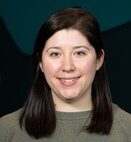
Published May 16, 2022.

